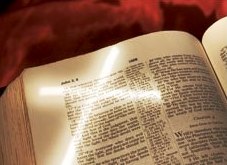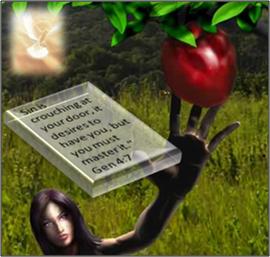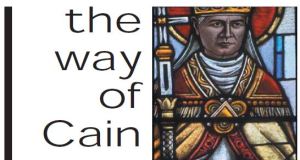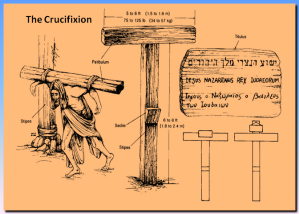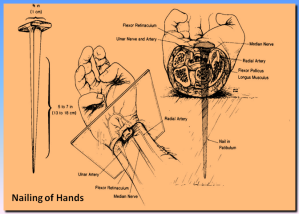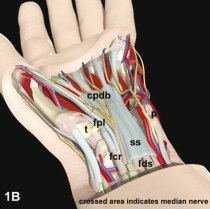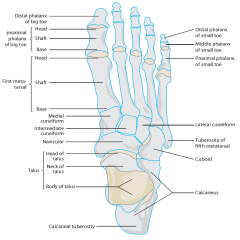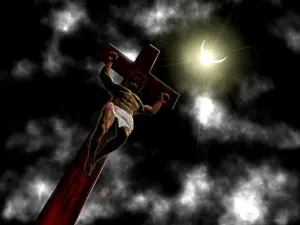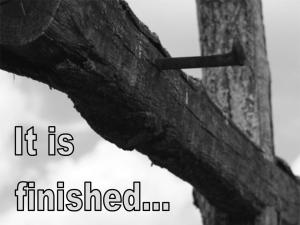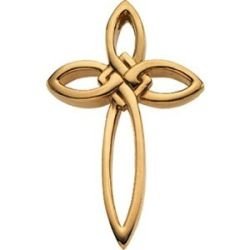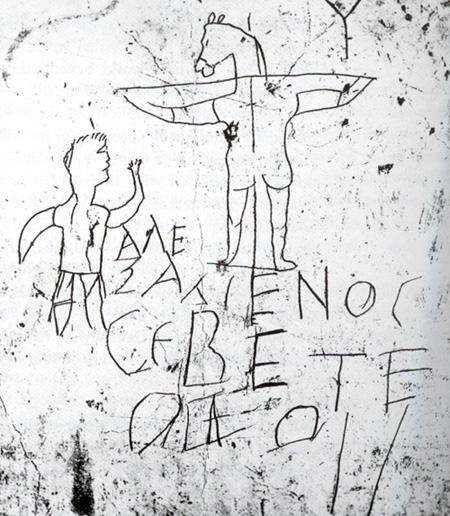 As we look at all we have “Because of the Cross”, we need to remember three Principles of the Cross:
As we look at all we have “Because of the Cross”, we need to remember three Principles of the Cross:
1. The Cross is the Wisdom & Power of God.
- The Cross reveals the Heart of God, His delight in mercy, justice and righteousness.
- At the Cross we partake of the unfailing love of God, the justice of being made right with God, and the Righteousness that is in Christ whereby we have victory over sin, over Satan and over death.
 2. The Cross is opposed to the wisdom and power of man.
2. The Cross is opposed to the wisdom and power of man.
- The cross requires humility. The cross strips man of all rights and powers. The Cross reveals the foolishness of man’s attempts at standing and self-righteousness.
- Man says to love yourself first, seek for yourself first. Instead of submitting to God’s love, We are our own person, we are OK as we are, we can do as we please as long as we don’t hurt anyone. Instead of submitting to God’s Justice, Man emphasizes your own accomplishments, your own standing, your own right to live as you see fit. Instead of depending upon God for our righteousness, Man emphasizes works, riches, possessions as justification for the way he lives.
3. The Cross represents the Perfect Blood Sacrifice required by God
- God declared that life is in the blood. The only way for sinful man to enjoy life with Holy God is through a blood sacrifice for our sins. The Cross is that perfect blood sacrifice.
We have seen the Principle of the Cross with Adam and Eve, and how Cain quickly established Man’s wisdom in opposition to the Cross. That Opposition grew until we read:
Genesis 6:5 The LORD saw that the wickedness of man was great in the earth, and that every intention of the thoughts of his heart was only evil continually.
So God called Noah to build an ark. God saved His creation by a worldwide flood, and the earth was transformed, and Noah and his family went forth to re-populate the earth. This new world was established with the Principle of the Cross, for Noah took of the clean animals and sacrificed them to God.
Kingdom of Man Rears its Sinful Head (NIMROD)
 In the Dispensation of Noah it did not take long for the wisdom and power of man to rear its ugly head in opposition to the Cross. Mighty men came along, led by Nimrod, the mighty hunter of men, and directly opposed God. They built a Tower that was reaching to the heavens, so they could worship themselves and insure a place of refuge should God ever decide to flood the earth again.
In the Dispensation of Noah it did not take long for the wisdom and power of man to rear its ugly head in opposition to the Cross. Mighty men came along, led by Nimrod, the mighty hunter of men, and directly opposed God. They built a Tower that was reaching to the heavens, so they could worship themselves and insure a place of refuge should God ever decide to flood the earth again.
God confounded the wisdom and power of man, and the languages of the earth were born, and the kingdom of man became fragmented.
In the face of God’s wisdom and power, man corrupted the Principle of the Cross, and began to sacrifice to gods of their own making. They worshipped ‘idols’ and engaged in religious worship in opposition to the Creator God Jehovah. They offered sacrifices as He demanded, but with hearts devoted to the kingdom of man. They created god’s of their own design, god’s whom they could worship as they chose. The altar of sacrifice had been corrupted by man to honor the god’s of their making, instead of the Making God!
It was among these idol worshippers in the “Ur of the Chaldees” that Jewish tradition has a young man named Abram working in his father’s idol merchant shop. This young man was about to receive a special call for Creator God. This is the beginning of the Patriarch Dispensation.
The Calling of Abram
Genesis 12:1-9 Now the LORD said to Abram, “Go from your country and your kindred and your father’s house to the land that I will show you. And I will make of you a great nation, and I will bless you and make your name great, so that you will be a blessing. I will bless those who bless you, and him who dishonors you I will curse, and in you all the families of the earth shall be blessed.” So Abram went, as the LORD had told him, and Lot went with him. Abram was seventy-five years old when he departed from Haran (best meaning ‘to tarry’). And Abram took Sarai his wife, and Lot his brother’s son, and all their possessions that they had gathered, and the people that they had acquired in Haran, and they set out to go to the land of Canaan. When they came to the land of Canaan, Abram passed through the land to the place at Shechem, to the oak of Moreh. At that time the Canaanites were in the land. Then the LORD appeared to Abram and said, “To your offspring I will give this land.” So he built there an altar to the LORD, who had appeared to him. From there he moved to the hill country on the east of Bethel and pitched his tent, with Bethel on the west and Ai on the east. And there he built an altar (mizbeah) to the LORD and called upon the name of the LORD. And Abram journeyed on, still going toward the Negeb.
We know Ur of the Chaldees was a ‘hotbed’ of idolatry for two reasons:
1. Abraham’s father, Terah according to Joshua 24:2, worshiped idols. Jewish tradition refers to Terah as an idol maker. Ur was an idolatrous city worshiping many different Gods such as the god of fire, moon, sun and stars. Sin was the name of the chief idol deity of Ur. Ningal, was the wife of the moon-god, Sin, and was worshiped as a mother God in many other cities. Ur was a evil and sinful city as can be seen in the worship practices of the moon-goddess, Ningal.[1]
Joshua 24:2 And Joshua said to all the people, “Thus says the LORD, the God of Israel, ‘Long ago, your fathers lived beyond the Euphrates, Terah, the father of Abraham and of Nahor; and they served other gods.
 2. Ur אור, which means flame or fire of the Chaldeans, from the worship practiced there. Scholars say the people of this area were worshippers of fire, and there is evidence of fire sacrifices to various gods.[2]
2. Ur אור, which means flame or fire of the Chaldeans, from the worship practiced there. Scholars say the people of this area were worshippers of fire, and there is evidence of fire sacrifices to various gods.[2]
Abram rejected the many god’s of his father’s, and followed the call of the one and only True God. Abram’s journey to Canaan was marked by humility resulting in the altar of sacrifice. At the Oak of Moreh God appeared to Abram and told Him, “To your offspring I will give this land.”
So which is it: Plains, encampments, oaks or terebinths? Different translations have served to obscure the great truth of this passage.
Plains and encampments, I think, can be dismissed immediately. They do not fit other passages using this expression. They cannot possibly be the correct translation of elonei mamre. That leaves oaks and terebinths. I’ll take oaks.
Here’s why. In the first place, while “oaks” is the oldest translation we have of elonei, “terebinths” is the most recent. The Septuagint rendition may represent a genuine tradition passed down from the time the book of Genesis was composed. Moreover, terebinths, whose small leaves indeed smell a bit like turpentine when crushed, may have an impressive-sounding name, but they are not very impressive in appearance. The terebinth is an evergreen shrub that rarely grows to more than 7 or 8 feet and is found all over Israel. The common Palestinian oak, on the other hand, develops into a tall, stately tree. A whole forest or grove of such trees, now seen in only a few places but less rare in Abraham’s time, is an impressive sight indeed. Certainly these could be a landmark worthy of mention in God’s Word.
 Would the Bible have bothered to point out that Abraham was sitting by some perfectly ordinary shrubs? In my thinking, the mighty Oak wins this match against the insignificant terebinth.[3].
Would the Bible have bothered to point out that Abraham was sitting by some perfectly ordinary shrubs? In my thinking, the mighty Oak wins this match against the insignificant terebinth.[3].
Evidently there was a significant tree in a grove of trees at Moreh near Shechem. The Hebrew moreh is derived from the verb yarah, “to teach,” “to direct,” and indicates one who directs, or gives oracular answers.[4] Picture a place known for receiving direction or oracles from God.
Now it was here that God first appeared to Abram, and confirmed to Abram that this was the land that God was giving him. No doubt Abram had seen the Canaanites, and had seen their vileness and fierceness. Perhaps he doubts were running rampant in his mind, doubts about the voice he had heard calling him. In the midst of those doubts, Abram saw God by that majestic tree. There God renewed His promise to Abram. As soon as God went away, Abram built an altar (place of sacrifice) unto God.
Can you picture Abram, a former idol worshipper, seeing Jehovah God? This was no wood carving, no stone object. Abram saw the Living Creator God. In the presence of God there are no doubts, there is only hope, there is only His love. Abram was so in awe of God that his first reaction was to build an altar and offer a sacrifice to God. Sinful man had met Holy God at the tree. At the tree Abram offered himself to God.
Does that sound like anything familiar to you?
 It is before this significant tree that an altar is made, sacrifice performed, and Abram’s life, family and possessions are committed to God’s Promise. Here we see the principle of the Cross in establishing Abram’s possession of the Promised Land.
It is before this significant tree that an altar is made, sacrifice performed, and Abram’s life, family and possessions are committed to God’s Promise. Here we see the principle of the Cross in establishing Abram’s possession of the Promised Land.
This appearance of God was significant, for just as God walked with Adam in the cool of the evening, so now God appeared to Abram in the coolness of the shade of the Oak Tree of Moreh. When ever God begins something new, His presence is all over it!
The Oak Tree of Moreh was near Shechem
There are 3 references to the Oak tree(s) of Moreh at Shechem in the Bible. Plus there is one more subtle reference worth noting.
1. Genesis 12:6-7
“Abram passed through the land as far as the site of Shechem, to the oak of Moreh. Now the Canaanite was then in the land. The LORD appeared to Abram and said, “To your descendants I will give this land.” So he built an altar there to the LORD who had appeared to him.”
 God called Abram out of the kingdom of the wisdom and power of man. He called Abram out of the land of idols and manmade gods. He called him to a new land, to form a new nation that followed Jehovah, their Creator God. He called Abram to follow God’s wisdom and power, and submit to the principle of the Cross. When Abram saw God, he submitted and sacrificed.
God called Abram out of the kingdom of the wisdom and power of man. He called Abram out of the land of idols and manmade gods. He called him to a new land, to form a new nation that followed Jehovah, their Creator God. He called Abram to follow God’s wisdom and power, and submit to the principle of the Cross. When Abram saw God, he submitted and sacrificed.
You are familiar with his life. Along this journey Abram made mistakes. He lied, he resorted to following the wisdom and power of man in having a baby boy Ishmael. Still, God blessed him, for God had set His Name upon Abram. Instead of being Abram, his name became Abraham, father of a great nation.
Finally, God gave him that promised son, Isaac. As we will see in later writings, the Principal of the Cross was upon Isaac, and upon Jacob. But for today, we are camping under the Oak of Moreh, near Shechem.
Abraham’s grandson had returned to the idol loving land of his great-grandfather. There he met his wife(s) and labored for his uncle, Laban. Jacob was a man who fit in well with the kingdom of Man. He was crafty, deceitful, proud and boasting. God still blessed him, because God had promised Abraham. God issued a call to Jacob to return to the Promised land, and face his estranged brother Esau. God was there when the brothers met. Jacob and his family were spared the wrath of Esau. And Jacob continued on, making a stop in Shechem.
Genesis 33:18-20 Now Jacob came safely to the city of Shechem, which is in the land of Canaan, when he came from Paddan-aram, and camped before the city. He bought the piece of land where he had pitched his tent from the hand of the sons of Hamor, Shechem’s father, for one hundred pieces of money. Then he erected there an altar and called it El-Elohe-Israel. (Meaning “El, the God of Israel”)
Even though Jacob offered sacrifices to God, the God of Israel, he was still living in the kingdom of man. He was still living by his own wiles. His heart was divided. (Notice he did not say “My God!”) Jacob had to learn a costly lesson before he could go on to the House of God (Bethel). Chapter 34 sees the chastening hand of God upon his Jacob and his family. At Shechem, his daughter Dinah was raped by the prince of the land (Shechem). What follows is deceit upon deceit, as Jacob’s sons plot to avenge their daughter, and the leaders of of Shechem plot to take Jacob’s livestock and possession. In a clever plot indicative of the treachery of their father, the sons of Jacob murder the men of Shechem, plunder their riches and livestock, take the women and children, and bring dishonor upon the house of Jacob.
Genesis 34:30-31 Then Jacob said to Simeon and Levi, “You have brought trouble on me by making me odious among the inhabitants of the land, among the Canaanites and the Perizzites; and my men being few in number, they will gather together against me and attack me and I will be destroyed, I and my household.” But they said, “Should he treat our sister as a harlot?”
In Genesis 35 we see that Jacob makes a decision to wholly follow God. Once again, the Oak Tree at Moreh plays a significant role.
2. Genesis 35:4
Then God said to Jacob, “Arise, go up to Bethel and live there, and make an altar there to God, who appeared to you when you fled from your brother Esau.” So Jacob said to his household and to all who were with him, “Put away the foreign gods which are among you, and purify yourselves and change your garments; and let us arise and go up to Bethel, and I will make an altar there to God, who answered me in the day of my distress and has been with me wherever I have gone.” So they gave to Jacob all the foreign gods which they had and the rings which were in their ears, and Jacob hid them under the oak which was near Shechem.
 God spells out the problem He had with Jacob. Sure, Jacob professes belief in God, even honoring Him with an altar and sacrifices. But Jacob’s heart was divided. He loved the Kingdom of Man, with its idols and riches. He was a “double-minded” man. His life in the land of idolatry had tainted his already flawed soul. Jacob and his sons were even dressing like the idol loving people of the land, thus the reference to the “rings in their ears” and their garments.
God spells out the problem He had with Jacob. Sure, Jacob professes belief in God, even honoring Him with an altar and sacrifices. But Jacob’s heart was divided. He loved the Kingdom of Man, with its idols and riches. He was a “double-minded” man. His life in the land of idolatry had tainted his already flawed soul. Jacob and his sons were even dressing like the idol loving people of the land, thus the reference to the “rings in their ears” and their garments.
Bethel was the “House of God” Bethel was the place of God that Abram pitched his tent, built an altar of sacrifice to God, and where he called upon the Name of the Lord! There is salvation in the House of God!
Genesis 12:8 Then he proceeded from there to the mountain on the east of Bethel, and pitched his tent, with Bethel on the west and Ai on the east; and there he built an altar to the LORD and called upon the name of the LORD.
God appeared to Abram, and he sacrificed to God. He continued on to Bethel, in the heart of Canaan, and pitched his tent, and called upon the Name of the Lord. You can almost see the progression of his heart. He answers the call of God, yet decides to tarry a while in Haran. After the death of his father, he decides to move to Canaan, and stops at Shechem. There he sees his Creator God. He submits and sacrifices. But you get the feeling he is not all in yet. But he travels further into Canaan, and decides to pitch his tent on a hillside at Bethel, the House of God. Abram has made a decision. He is all in. There is no turning back. His tent is pitched, and He cries out to God!
We see the Principle of the Cross at work in his life, and we will see why he did what he did with Isaac next week.
 As with Abram, God called Jacob to come to a place of decision. What will Jacob do? Will he come to God with everything, depend upon God for everything? Is he ready to forsake the crafty kingdom of Man and give himself 100% to Jehovah God? There is no use going to Bethel if your heart is divided. God is a jealous God. He wants all of us. Jacob can’t deceive God like he did his father, like he did Laban. God could see Jacob’s heart, that it was divided.
As with Abram, God called Jacob to come to a place of decision. What will Jacob do? Will he come to God with everything, depend upon God for everything? Is he ready to forsake the crafty kingdom of Man and give himself 100% to Jehovah God? There is no use going to Bethel if your heart is divided. God is a jealous God. He wants all of us. Jacob can’t deceive God like he did his father, like he did Laban. God could see Jacob’s heart, that it was divided.
He can offer as many sacrifices to God as he wants, but unless his heart is given 100% to God, it does no good. This is what God means when He says it is better to obey than to sacrifice.
Here at Shechem, in spite of the pain of his heart over Dinah and his sons, Jacob makes a decision to follow God fully. He and his household obeyed God and put all of the idols and their precious possessions at the foot of the Oak tree.
This is what we do at the foot of the Cross!
Fast forward a few hundred years. Jacob died in Egypt, and the descendants of Abraham, Isaac and Jacob escaped the slavery of Pharaoh. It had been 400 years since they had been in the promised land. God used a meek man to lead his people from Egypt. Now in Deut. 11 Moses is addressing the people.
3. Deuteronomy 11:29-30.
“It shall come about, when the LORD your God brings you into the land where you are entering to possess it, that you shall place the blessing on Mount Gerizim and the curse on Mount Ebal. “Are they not across the Jordan, west of the way toward the sunset, in the land of the Canaanites who live in the Arabah, opposite Gilgal, beside the oaks of Moreh?
 Moses has shared the Law of God with his people. He has detailed all the blessings God promises to those who wholly follow the Lord. He instructs them to go to the Oaks of Moreh, and stand upon the two mountains there, Ebal and Gerizim. There they are to dedicate themselves to following God and His Word completely, and they are to acknowledge the blessings and cursing associated with that commitment.
Moses has shared the Law of God with his people. He has detailed all the blessings God promises to those who wholly follow the Lord. He instructs them to go to the Oaks of Moreh, and stand upon the two mountains there, Ebal and Gerizim. There they are to dedicate themselves to following God and His Word completely, and they are to acknowledge the blessings and cursing associated with that commitment.
The account of that event is given in chapters 27 and 28 of Deuteronomy.
Deuteronomy 27:4-8 And when you have crossed over the Jordan, you shall set up these stones, concerning which I command you today, on Mount Ebal, and you shall plaster them with plaster. And there you shall build an altar to the LORD your God, an altar of stones. You shall wield no iron tool on them; you shall build an altar to the LORD your God of uncut stones. And you shall offer burnt offerings on it to the LORD your God, and you shall sacrifice peace offerings and shall eat there, and you shall rejoice before the LORD your God. And you shall write on the stones all the words of this law very plainly.”
One by one the Levites read the Blessings and Curses of the Law
Can you hear them: ‘Cursed be anyone who does not confirm the words of this law by doing them.’ (Deuteronomy 27:26)
And all the people shout, ‘Amen!’
 The vibrating, thundering chorus of two million of voices shouting ‘Amen’ in unison to the terms of the covenant, from hill to hill, echoed powerfully in the streets of Shechem below. The Oaks of Moreh were shaking in response. They were witnesses to this momentous occasion.
The vibrating, thundering chorus of two million of voices shouting ‘Amen’ in unison to the terms of the covenant, from hill to hill, echoed powerfully in the streets of Shechem below. The Oaks of Moreh were shaking in response. They were witnesses to this momentous occasion.
The Jordan river signifies death to the wisdom and power of man. When Israel passed over the Jordant, they were symbolically announcing that they were dying to life in the wisdom and power of the flesh, and were now living in the wisdom and power of God and His Word. They were embracing the Principle of the Cross. This was so important, that at the end of Joshua’s life, he had the people return to this spot and reaffirm their commitment to following God’s Word.
Covenant ratified one more time…
At the end of his life, Joshua called for Israel to assemble again — at Shechem. The solemnity of the occasion cannot be expressed better than by its simple yet inspired biblical description:
Joshua 24:1 Joshua gathered all the tribes of Israel to Shechem and summoned the elders, the heads, the judges, and the officers of Israel. And they presented themselves before God.
Joshua recounted God’s faithfulness from the time of Abram’s calling until He gave them the Promised Land. He solemnly impressed upon them the importance of keeping faithfulness with God and his covenant. Listen as Joshua brings the point home:
Joshua 24:14-15 “Now therefore fear the LORD and serve him in sincerity and in faithfulness. Put away the gods that your fathers served beyond the River and in Egypt, and serve the LORD. And if it is evil in your eyes to serve the LORD, choose this day whom you will serve, whether the gods your fathers served in the region beyond the River, or the gods of the Amorites in whose land you dwell. But as for me and my house, we will serve the LORD.”
The people responded that YES! They would serve the Lord! Joshua tried to tell them they were not able to serve the Lord:
Joshua 24:19-21 Joshua said to the people, “You are not able to serve the LORD. He is a holy God; he is a jealous God. He will not forgive your rebellion and your sins. If you forsake the LORD and serve foreign gods, he will turn and bring disaster on you and make an end of you, after he has been good to you.” But the people said to Joshua, “No! We will serve the LORD.”
So Joshua told them: “Now then, throw away the foreign gods that are among you and yield your hearts to the LORD, the God of Israel.” (Joshua 24:23)
So Joshua took a large stone and placed it under the Oak by the sanctuary of the Lord (in Shechem). That stone represented their decision to yield their hearts totally to God! This is what Abram had done! This is what Jacob had done! This is the Principle of the Cross!
Joshua 24:24-27 The people said to Joshua, “We will serve the LORD our God and we will obey His voice.” So Joshua made a covenant with the people that day, and made for them a statute and an ordinance in Shechem. And Joshua wrote these words in the book of the law of God; and he took a large stone and set it up there under the oak that was by the sanctuary of the LORD. Joshua said to all the people, “Behold, this stone shall be for a witness against us, for it has heard all the words of the LORD which He spoke to us; thus it shall be for a witness against you, so that you do not deny your God.”
 That stone was not the only witness. The Principle of the Cross was there at Shechem in the form of the Oak tree of Moreh. Eight hundred years had elapsed since Abram first built an altar under the Shechem oak tree. The original oak tree had probably given way to an offspring. But the mention of the ‘sanctuary of the Lord’ confirms this Oak tree was probably near the altars built by Abram and Jacob, and was now taken to be the official substitute.
That stone was not the only witness. The Principle of the Cross was there at Shechem in the form of the Oak tree of Moreh. Eight hundred years had elapsed since Abram first built an altar under the Shechem oak tree. The original oak tree had probably given way to an offspring. But the mention of the ‘sanctuary of the Lord’ confirms this Oak tree was probably near the altars built by Abram and Jacob, and was now taken to be the official substitute.
I can see Joshua pointing to the altars and the tree as he recounts their stories to his people. I can hear him tell them that God appeared to Abram at this very spot. I can see him pointing to the ground and saying, “somewhere down there are the pagan gods your father Jacob buried; do the same, bury your false gods, and serve the one true God only.” On that day, under Abram’s tree of promise, Israel ratified her covenant with God, the covenant she had made at Sinai nearly one hundred years earlier.
Treason at the Cross
Everyone remembers the story of Gideon and the way God used him in a miraculous deliverance of Israel from the Midianites. After that victory, the men of Israel wanted to make Gideon King.
Judges 8:22-23 Then the men of Israel said to Gideon, “Rule over us, you and your son and your grandson also, for you have saved us from the hand of Midian.” Gideon said to them, “I will not rule over you, and my son will not rule over you; the LORD will rule over you.”
Now Gideon (Jerubbaal) had seventy sons, for he had many wives. One son was Abimelech, born of a concubine who lived in Shechem. After Gideon died, Abimelech schemed to become King over the land. He got the leaders of Shechem on his side, got them to pay him money with which he hired thugs. Then he murdered 70 sons of Gideon with one stone. One son, Jotham, got away.
Immediately, “all the leaders of Shechem came together, and all Beth-millo, and they went and made Abimelech king, by the oak of the pillar at Shechem.” (Judges 9:6)
At the very spot where, under the very tree where, next to the very pillar where, three hundred years earlier, all Israel had sworn faithfulness to God and His covenant, where one thousand years earlier God first made the covenantal promises to Abram, where Jacob later buried the vestiges of his false gods, the populace of Shechem declared that a mere, evil man, was now their king [6].
Rebellious men refused to humble themselves to the Cross, and so rejected God in favor of man’s wisdom and power. Shechem erected the Kingdom of Man in opposition to the Kingdom of God.
 The outcome was utter disaster, perhaps even greater than that which had occurred in the same city hundreds of years earlier when Simeon and Levi slaughtered the entire male population.
The outcome was utter disaster, perhaps even greater than that which had occurred in the same city hundreds of years earlier when Simeon and Levi slaughtered the entire male population.
Read the entire account for yourself in Judges 9:1-20. In short, the honeymoon between Abimelech and the Shechemites was short-lived. God set animosity between them, resulting in Abimelech’s massacre of the entire population. One thousand people perished in one incident when Abimelech set fire to the temple of Baal in which they were cringing in fear. That one thousand people could fit inside testifies to its considerable size.
Why did this disaster occur? Listen carefully to what Jotham, Abimelech’s lone surviving brother, had to say to the citizens of Shechem days before the massacre:
Jotham told a parable, about the trees wanting someone to reign over them as a King. The tried the Olive Tree, the Fig Tree, a Vine, and each one refused. Finally they went to a lowly bramble bush, and he accepted.
Jotham warned the people:
Judges 9:16-20 “Now if you have acted faithfully and honestly in making Abimelech king, if you have done well by Jerubbaal (Gideon) and his family, and if you have rewarded him appropriately for what he did— for my father fought for you, risked his life, and delivered you from the hand of Midian, and now you have attacked my father’s house today, killed his 70 sons on top of a large stone, and made Abimelech, the son of his slave, king over the lords of Shechem ‘because he is your brother’— if then you have acted faithfully and honestly with Jerubbaal and his house this day, rejoice in Abimelech and may he also rejoice in you. But if not, may fire come from Abimelech and consume the lords of Shechem and Beth-millo, and may fire come from the lords of Shechem and Beth-millo and consume Abimelech.”
 Twice in one short message Jotham tells the people to judge themselves, whether or not they have acted faithfully and honestly. Understand, the Cross is a divider of men. It divids the children of God from the children of the world. It divides Spirit-filled believers from fleshly pretenders, or worldly Christians. There is Blessing at the foot of the Cross. There is Cursing at the Foot of the Cross. You can bear the curse yourself, or you can realize that Jesus became cursed for you upon that Cross. Yield your heart to the Cross, and enjoy the Blessings of Jesus Christ!
Twice in one short message Jotham tells the people to judge themselves, whether or not they have acted faithfully and honestly. Understand, the Cross is a divider of men. It divids the children of God from the children of the world. It divides Spirit-filled believers from fleshly pretenders, or worldly Christians. There is Blessing at the foot of the Cross. There is Cursing at the Foot of the Cross. You can bear the curse yourself, or you can realize that Jesus became cursed for you upon that Cross. Yield your heart to the Cross, and enjoy the Blessings of Jesus Christ!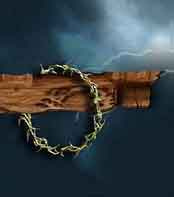
We have a tree that rules over us. It is the Cross of Jesus Christ. We do not worship the Tree, for it is but a principle. We worship the one who was crucified upon that tree. He is our King, He is our Lord. The principle of the Cross must be applied to our lives if He is to reign!
[1] Halley’s Bible Handbook, Henry H. Halley, Zondervan Pub. House, Grand Rapids, page 95.
[2] Adam Clarke, A Commentary and Critical Notes, (New York: Abingdon-Cokesbury Press, 1826), WORDsearch CROSS e-book, Under: “Genesis 11”.
[3]“Oaks or Terebinths?” Philologos, http://forward.com/articles/11956/oaks-or-terebinths-/
[5] Victor P. Hamilton, The Book of Genesis, Chapters 1-17, 1990, Wm. B. Eerdmans Publishing Company, Grand Rapids, p. 389.







